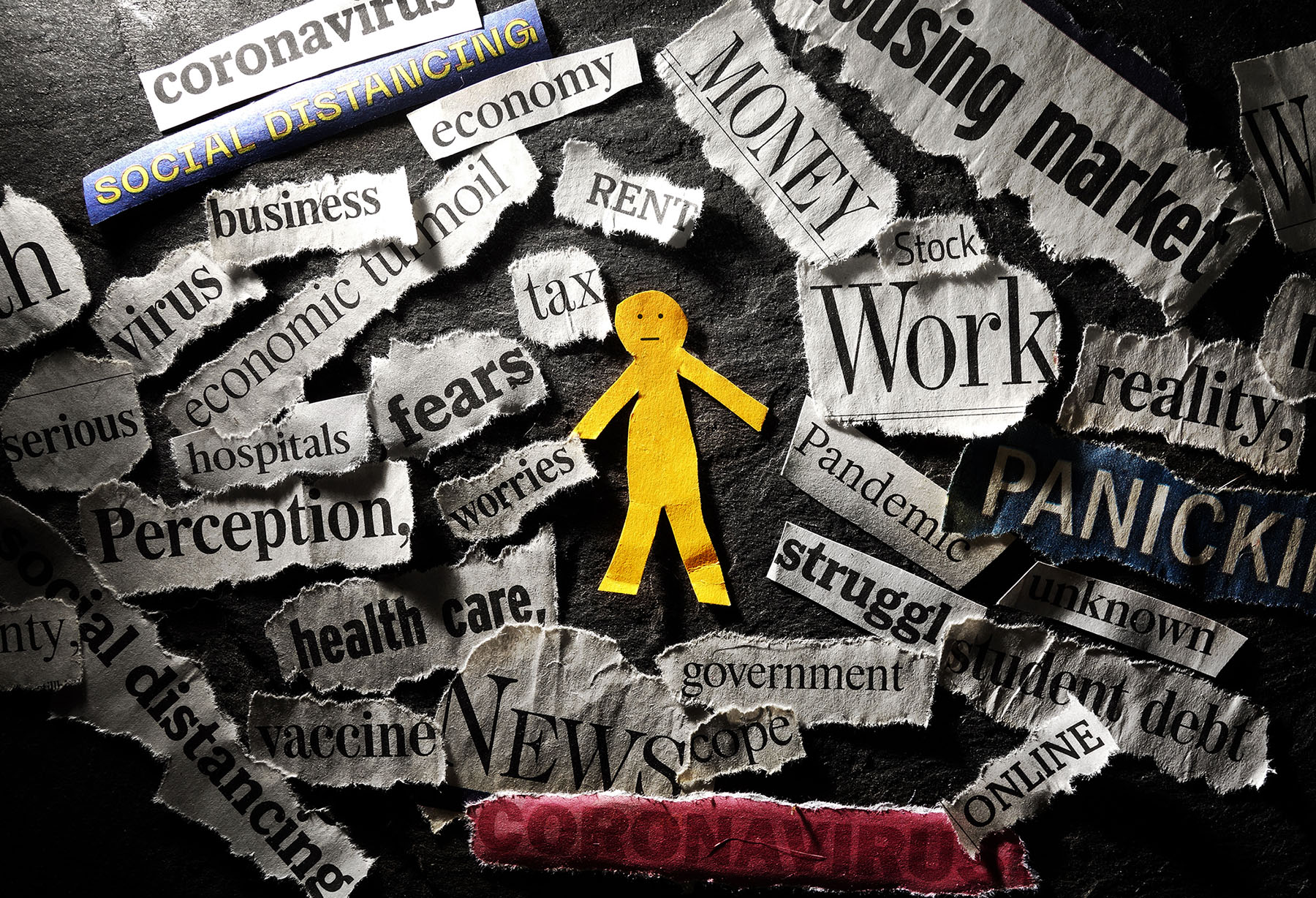Mitigating Teacher Stress and Burnout from the Pandemic
December 13, 2021
 Standing in-line behind a fellow shopper at the grocery store, I (first author) couldn’t
help but overhear her cell phone conversation. She lamented the lack of workers and
the inconvenience she felt due to the store’s reduced hours. Her exasperation was
palpable as she enumerated the many inconveniences she had experienced in previous
months; the longer waits for tables at restaurants, empty shelves in stores, and her
child being sent home from school due to Covid-19 exposure. We all know these same
frustrations. Our lives have changed in tangible ways and the impact of Covid-19 will
likely last for some time.
Standing in-line behind a fellow shopper at the grocery store, I (first author) couldn’t
help but overhear her cell phone conversation. She lamented the lack of workers and
the inconvenience she felt due to the store’s reduced hours. Her exasperation was
palpable as she enumerated the many inconveniences she had experienced in previous
months; the longer waits for tables at restaurants, empty shelves in stores, and her
child being sent home from school due to Covid-19 exposure. We all know these same
frustrations. Our lives have changed in tangible ways and the impact of Covid-19 will
likely last for some time.
According to an American Psychological Association (APA) and Harris Poll survey (2021) of over 3,000 adults nationally, focused on stress and decision-making during the pandemic, respondents reported feeling overall optimistic about the pandemic ending (70%). However, pandemic-related stress symptoms have continued for many. Respondents reporting the greatest stress levels were younger (Generation Z, Millenials), had lower income levels (below $50,000 per year), and were parents. Individuals with low stress resilience were more likely to report stress levels so high that they had difficulty making basic decisions daily (i.e., what to eat, what to wear). Respondents with high stress levels avoided social situations (24%), altered eating habits (23%), procrastinated or neglected responsibilities (22%), or altered physical activity levels (22%) (APA, 2021). Moreover, 74% of respondents reported a physical impact of stress such as headaches (34%), feeling overwhelmed (34%), fatigue (32%), and changes in sleep (32%). Physical symptomology was exacerbated for parents compared to non-parents (83% vs. 69% respectively) (APA, 2021).
The APA (2021) poll is important because it gives us a general, national snapshot of adults’ post-Covid mental health with which we can compare specific sub-populations, such as teachers. Steiner and Woo (2021) reported results of a survey conducted by RAND and supported by the National Education Association (NEA) and the American Federation of Teachers (AFT). Results of the State of the U.S. Teacher Survey were grave: the pandemic was increasing job related stress that threatened the long-term U.S. teaching workforce. Steiner and Woo (2021) found that a substantially greater percent of teachers reported stress and depression during the pandemic than did the general U.S. population. Major stressors listed by teachers included: teaching dual instruction simultaneously (in-person and online), remote instruction, the health of a loved one, the teacher’s own health, and teaching in-person. Furthering this stress, one in three teachers were caring for their own children during this time (Steiner & Woo, 2021). Similarly, Pressley (2021) found that significant predictors of teacher stress during the pandemic were: Covid-19 anxiety, instructional anxiety, communicating with parents, and administrative support.
Major stressors listed by teachers included: teaching dual instruction simultaneously (in-person and online), remote instruction, the health of a loved one, the teacher’s own health, and teaching in-person. Furthering this stress, one in three teachers were caring for their own children during this time (Steiner & Woo, 2021). Similarly, Pressley (2021) found that significant predictors of teacher stress during the pandemic were: Covid-19 anxiety, instructional anxiety, communicating with parents, and administrative support.
Abramson (2021) noted that parents who are already experiencing high occupational stress and the compounding effects of the pandemic, may also experience parental burnout. Parental burnout is characterized by exhaustion, chronic stress, emotional distance between the parent and child, punitive disciplinary practices, and feelings of depression, wanting to escape or suicidal ideation. This overwhelming stress and burnout led many parents to reconsider their life priorities, particularly their career and family goals. Given that one in three teachers may be parenting while teaching, it is no wonder that they feel the immense stress daily of work and home and may be reconsidering their role in the classroom.
In a report issued by the Brookings Institute, Zamarro et al. (2021) found that teachers are less career committed than they were pre-pandemic. The term “The Great Resignation” refers to the phenomenon of employers seeking to hire and retain their employees; simultaneously, many employees are rethinking their work-life balance, their futures, and the sustainability of their career choices. With economic recovery and opportunities for teachers to find other employment, we may see teachers leaving the profession in greater numbers in the next few years.
 In a study disaggregating teacher shortages during the pandemic by specialty area,
geographical location, and socioeconomics, Goldhaber and Gratz (2021) found that districts
are currently facing the greatest staffing challenges in rural, high-poverty areas.
The teaching positions hardest to fill were special education teachers. The future
of education in the U.S. hinges upon our ability to recruit and keep outstanding teachers.
In a study disaggregating teacher shortages during the pandemic by specialty area,
geographical location, and socioeconomics, Goldhaber and Gratz (2021) found that districts
are currently facing the greatest staffing challenges in rural, high-poverty areas.
The teaching positions hardest to fill were special education teachers. The future
of education in the U.S. hinges upon our ability to recruit and keep outstanding teachers.
In a study disaggregating teacher shortages during the pandemic by specialty area, geographical location, and socioeconomics, Goldhaber and Gratz (2021) found that districts are currently facing the greatest staffing challenges in rural, high-poverty areas. The teaching positions hardest to fill were special education teachers. The future of education in the U.S. hinges upon our ability to recruit and keep outstanding teachers.
The term “The Great Resignation” refers to the phenomenon of employers seeking to hire and retain their employees; simultaneously, many employees are rethinking their work-life balance, their futures, and the sustainability of their career choices. With economic recovery and opportunities for teachers to find other employment, we may see teachers leaving the profession in greater numbers in the next few years.
The newest coronavirus variant of concern (VoC) is Omicron, yet it is likely that the virus will keep mutating. Schools are continuing to develop protocols for students, faculty, and staff based on legislation and policy. On December 6, 2021 a legislative committee rejected a proposal to make coronavirus vaccinations mandatory for Louisiana K-12 students. Louisiana’s Governor, John Bel Edwards, has claimed he will overrule this decision. And so, the debate over public health continues. Teachers, like medical professionals, will remain at the center of this debate as individuals exposed daily to coronavirus in their work settings.
What can be done to support teachers' mental health?
The great news is that educational administrators, parents, community stakeholders and students can do a lot to retain teachers. All of us can and should play a role in helping our communities recover and schools are a great place to start. A planned, strategic approach to whole school wellness is important. Schools across the country have started to recognize the need for trauma informed care and social emotional learning for students, we need to consider a similar approach for our teaching colleagues. Here are some things that can help support teachers:
Support teachers’ mental health, protect their time, and develop comprehensive well-being programs in your district (NEA, 2021).
This should not be one day per year or one day each semester. Consider creating a space in the school (such as a restoration room) where teachers can go when they need a mental health break during the day. Teacher support groups are another successful strategy.
Ensure that teachers know how to support students’ mental health needs. Provide professional development resources for teachers that address their own and their students’ wellness (NEA, 2021).
Santoro and Acosta Price (2021) suggested that principals can build positive relationships by showing mutual respect, integrity, personal regard, and promoting open communication with teachers. Other strategies involved celebrating incremental progress and having consistent policies, procedures and expectations.
Recognize teachers often, highlight their accomplishments, create infinity groups, provide mentors (and incentivize mentorship), and support educator anti-racist practices (Santoro & Acosta Price, 2021).
Encourage and provide teacher learning, minimize administrative paperwork, and allow teacher autonomy (NEA, 2021).
Help teachers learn new ways to cope with stress and provide materials and time for them to practice mindfulness (Santoro & Acosta Price, 2021). For ideas on creating a Mindfulness space, please make an appointment to visit our College of Human Sciences and Education Restoration Room at CHSERR@lsu.edu.
Consider having district Human Resources or curriculum leaders conduct stay interviews. Ask what strengths or challenges teachers have noticed in their work since coronavirus began. Discuss what would help teachers to feel more satisfied in their work. These should not be conducted with performance interviews (Finnegan, 2015).

Summary
Covid-19 has brought new challenges to schools. Teachers, like other employees, are struggling with the mental health strain and burnout that comes from working during a pandemic. Retaining and keeping great teachers is necessary for student success. There are research-based strategies that can mitigate covid teacher attrition and improve teacher commitment and wellness.
References
Abramson, A. (October 1, 2021). The impact of parental burnout: What psychological
research suggests about how to recognize and overcome it. Monitor on Psychology, 52(7). https://www.apa.org/monitor/2021/10/cover-parental-burnout
American Psychological Association. (2021). Stress in America™ 2021: Stress and decision-making during the pandemic. https://www.apa.org/news/press/releases/stress/2021/october-decision-making
Finnegan, R. (2015). The stay interview: A manager’s guide to keeping the best and the brightest. Haper Collins Publishing.
Goldhaber, D. & Gratz, T. (2021). School district staffing challenges in a rapidly recovering economy. CEDR Flash Brief No. 11082021-1. University of Washington, Seattle, WA.
Pressley, T. (2021). Factors contributing to teacher burnout during covid-19. Educational Researcher, (50)5, 325–327. DOI: 10.3102/0013189X211004138
Santoro, D.A. & Acosta Price, O. (2021). Structural supports to promote teacher well-being. Brief No.19. Annenberg Institute for School Reform. https://annenberg.brown.edu/sites/default/files/EdResearch_for_Recovery_Brief_19.pdf
Steiner, E.D., & Woo, A. (2021). Job-related stress threatens the teacher supply: Key findings from the 2021 State of the U.S. Teacher Survey. Research Report. RAND ©. https://www.rand.org/pubs/research_reports/RRA1108-1.html
Zamarro, G., Camp, A., Fuchsman, D., & McGee, J. B. (2021). Understanding how COVID-19 has changed teachers’ chances of remaining in the classroom. education reform faculty and graduate students publications. https://www.brookings.edu/blog/brown-center-chalkboard/2021/09/08/how-the-pandemic-has-changed-teachers-commitment-to-remaining-in-the-classroom/
Written by: J. Curry, PhD and I. Csaszar, PhD
Jennifer R. Curry, PhD, NCC, Shirley B. Barton Endowed Professor in the College of Human Sciences & Education, teaches in the counselor education program at Louisiana State University. Dr. Curry’s research interests include career and college readiness and school counselor induction and development. Her professional experiences include investigating crimes against children and serving as an elementary, middle, and high school counselor. She has published over 50 peer reviewed articles and six books. Her books include P-12 Career and College Readiness Counseling (3rd ed.) published by Springer and co-authored with A. Milsom, Promising Practices for High School Apprenticeships published by the American School Counselor Association (ASCA), African Americans’ Career and College Readiness: The Journey Unraveled, co-edited with M. Ann Shillingford-Butler published by Lexington, and Integrating Play Techniques in Comprehensive School Counseling Programs co-edited with Laura Fazio-Griffith. Dr. Curry has presented her work nationally and internationally at over 150 professional conferences. She serves as an associate editor for Professional School Counseling and she has served as a delegate of ASCA’s national assembly and President of the Louisiana School Counselor Association (LSCA). She is the recipient of the American Counseling Association’s (ACA) Ross Trust Award, Association for Spiritual, Ethical, and Religious Values in Counseling’s (ASERVIC) Judith Miranti Lifetime Service Award, the ASERVIC Meritorious Service Award, the Biggs Pine Publication Award, Louisiana Counseling Association’s (LCA) Research Award, LCA’s Advocacy Award, Louisiana State University’s Distinguished Faculty Award, and Vanderbilt’s Roger Aubrey Northstar Award for the person most likely to change the field of counseling.
Imre Emeric Csaszar, PhD, was born and raised in Budapest, Hungary. Prior to the communist regime change he immigrated to the U.S. in 1989. He has lived in the U.S. for 23 years and became a U.S. citizen in 2006. He earned his undergraduate degree in behavioral sciences and pastoral counseling at Toccoa Falls College in Georgia. He holds a master’s degree from Stetson University in Deland, Florida in Marriage, Family, and Couples Therapy. He earned his PhD in Higher Education Administration at Louisiana State University. Dr. Csaszar is a licensed professional counselor and counselor supervisor in the state of Louisiana and also holds a certification as nationally certified counselor. His experience includes working in mental health triage, substance abuse counseling, and experiential, adventure based therapy with at-risk youth. His main focus is teaching and assessment and accreditation in education administration. His research interests include: stress reduction, holistic wellness and meditation: particularly loving kindness meditation.